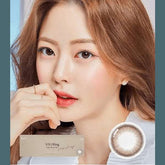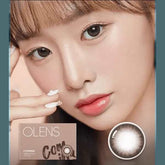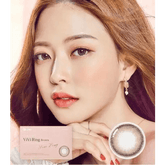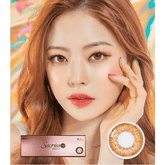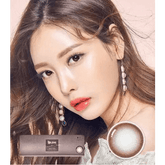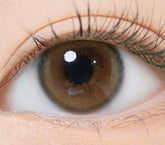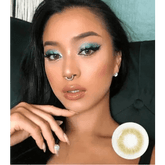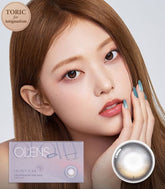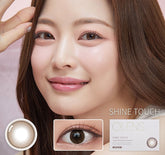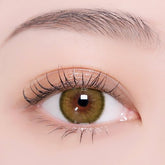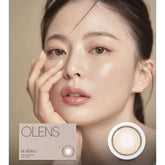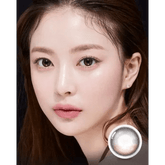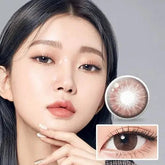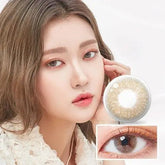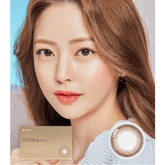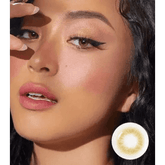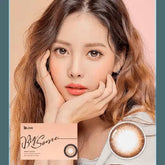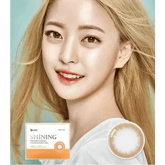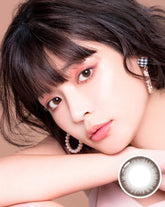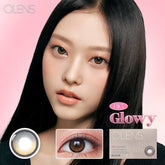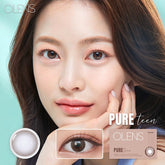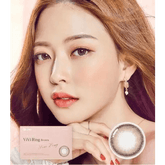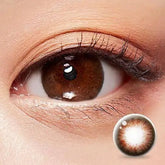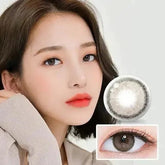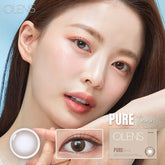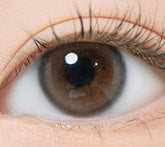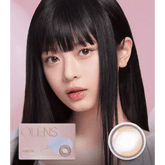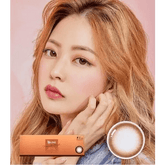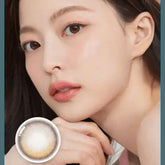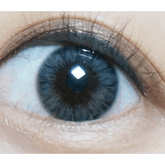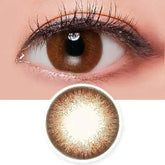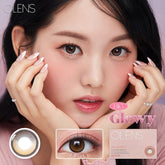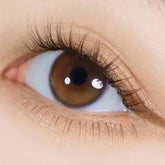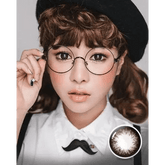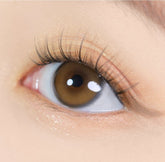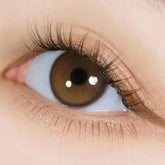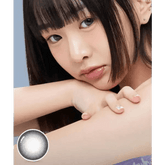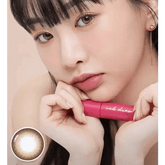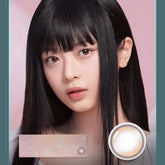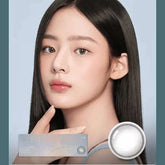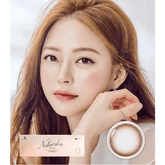-
Olens O2 Edition Clear (40p)Vendor: OLENSOlens O2 Edition Clear: Elevate Your Beauty Introducing Olens O2 Edition Clear Contacts If you're looking to enhance the natural allure of your eyes, Olens O2 Edition Clear contact lenses are the perfect choice. In this comprehensive guide, we will delve into the details...
- $37.99
$55.00- $37.99
- Unit price
- per
Save $17.01 -
Olens ViVi Ring 1Day Choco (20p)Vendor: OLENSOlens ViVi Ring 1Day Choco: Elevate Your Look Introducing Olens ViVi Ring 1Day Choco Contacts If you're seeking to enhance the natural allure of your eyes, Olens ViVi Ring 1Day Choco contact lenses are the ideal choice. In this comprehensive guide, we will delve...
- $31.99
$42.00- $31.99
- Unit price
- per
Save $10.01 -
Olens Coming ChocoVendor: OLENSOlens Coming Choco: Enhance Your Beauty Introducing Olens Coming Choco Contacts If you're looking to enhance your natural beauty, Olens Coming Choco contact lenses are the perfect choice. In this comprehensive guide, we will provide you with all the details about Olens Coming Choco...
- $29.99
$44.00- $29.99
- Unit price
- per
Save $14.01 -
Olens ViVi Ring BrownVendor: OLENSOlens ViVi Ring Brown: Elevate Your Beauty Introducing Olens ViVi Ring Brown Contacts If you're seeking to enhance the natural allure of your eyes, Olens ViVi Ring Brown contact lenses are the ideal choice. In this comprehensive guide, we will provide a detailed overview...
- $29.99
$44.00- $29.99
- Unit price
- per
Save $14.01 -
Olens Secriss 3con Coral Gray (20p)Vendor: OLENSOlens Secriss 3con Coral Gray 1Day (20p) Elevate Your Look with Olens Secriss 3con Coral Gray 1Day Contacts If you're aiming to enhance your natural beauty and captivate onlookers, Olens Secriss 3con Coral Gray 1Day contact lenses are the ideal choice. In this comprehensive...
- $31.99
$42.00- $31.99
- Unit price
- per
Save $10.01 -
Olens Secriss 3con Coral Brown 1Day (20p)Vendor: OLENSOlens Secriss 3con Coral Brown 1Day: Embrace Daily Elegance Introducing Olens Secriss 3con Coral Brown 1Day Contacts If you're seeking to enhance your daily look with a touch of elegance, Olens Secriss 3con Coral Brown 1Day contact lenses are the perfect choice. In this...
- $31.99
$42.00- $31.99
- Unit price
- per
Save $10.01 -
Olens Misty Romantic Choco (20p)Vendor: OLENSOlens Misty Romantic Choco (20p): Elevate Your Beauty Introducing Olens Misty Romantic Choco (20p) Contacts If you're looking to enhance the natural allure of your eyes, Olens Misty Romantic Choco (20p) contact lenses are the perfect choice. In this comprehensive guide, we will delve...
- $31.99
$42.00- $31.99
- Unit price
- per
Save $10.01 -
i-DOL Eyeis Melo BrownVendor: I-DOLi-DOL Eyeis Melo Brown: Elevate Your Beauty Introducing i-DOL Eyeis Melo Brown Contacts If you're looking to enhance the natural allure of your eyes, i-DOL Eyeis Melo Brown contact lenses are the perfect choice. In this comprehensive guide, we will delve into the details...
- $34.99
$45.00- $34.99
- Unit price
- per
Save $10.01 -
Olens Scandi OliveVendor: OLENSOlens Scandi Olive: Embrace Subtle Elegance Introducing Olens Scandi Olive Contacts If you're looking to enhance the natural allure of your eyes, Olens Scandi Olive contact lenses are the perfect choice. In this comprehensive guide, we will delve into the details of Olens Scandi...
- $29.99
$44.00- $29.99
- Unit price
- per
Save $14.01 -
Olens Glowy Black Toric (For astigmatism)Vendor: OLENSOlens Glowy Black Toric: Embrace Captivating Black Contacts for Astigmatism Introducing Olens Glowy Black Toric Contact Lenses If you're seeking to enhance your natural beauty and address astigmatism, Olens Glowy Black Toric contact lenses are the ideal choice. In this comprehensive guide, we will...
- $32.99
$46.00- $32.99
- Unit price
- per
Save $13.01 -
Olens Shine Touch Milky ChocoVendor: OLENSOlens Shine Touch Milky Choco: Embrace Subtle Elegance Introducing Olens Shine Touch Milky Choco Contacts If you're searching for contact lenses that enhance your natural beauty with a touch of elegance, look no further than Olens Shine Touch Milky Choco. In this comprehensive guide,...
- $29.99
$44.00- $29.99
- Unit price
- per
Save $14.01 -
i-DOL Canna Roze Olive GreenVendor: I-DOLI-DOL Canna Roze Olive Green: Elevate Your Beauty Introducing I-DOL Canna Roze Olive Green Contacts If you're seeking to enhance the natural allure of your eyes, I-DOL Canna Roze Olive Green contact lenses are the ideal choice. In this comprehensive guide, we will delve...
- $30.99
$45.00- $30.99
- Unit price
- per
Save $14.01 -
Olens Real Ring BrownVendor: OLENSOlens Real Ring Brown: Elevate Your Beauty Introducing Olens Real Ring Brown Contacts If you're seeking to enhance the natural allure of your eyes, Olens Real Ring Brown contact lenses are the perfect choice. In this comprehensive guide, we will delve into the details...
- $29.99
$44.00- $29.99
- Unit price
- per
Save $14.01 -
Olens Eyelighter Glowy 1Day Black (20p)Vendor: OLENSOlens Eyelighter Glowy 1Day Black: Elevate Your Look Introducing Olens Eyelighter Glowy 1Day Black Contacts If you're looking to enhance the natural beauty of your eyes, Olens Eyelighter Glowy 1Day Black contact lenses are the perfect choice. In this comprehensive guide, we will provide...
- $31.99
$42.00- $31.99
- Unit price
- per
Save $10.01 -
LensTown Back to Basic Street Ash BrownVendor: LENSTOWNLensTown Back to Basic Street Ash Brown: Elevate Your Look Introducing LensTown Back to Basic Street Ash Brown Contacts If you're looking to enhance your natural beauty, LensTown Back to Basic Street Ash Brown contact lenses are the perfect choice. In this comprehensive guide,...
- $28.99
$42.00- $28.99
- Unit price
- per
Save $13.01 -
LensTown Kiralet Brown ToricVendor: LENSTOWNLensTown Kiralet Brown Toric: Elevate Your Look Introducing LensTown Kiralet Brown Toric Contacts If you're seeking to enhance the natural allure of your eyes while addressing astigmatism, LensTown Kiralet Brown Toric contact lenses are the perfect choice. In this comprehensive guide, we will delve...
- $64.99
$85.00- $64.99
- Unit price
- per
Save $20.01 -
Olens ViVi Ring ChocoVendor: OLENSOlens ViVi Ring Choco: Elevate Your Beauty Introducing Olens ViVi Ring Choco Contacts If you're seeking to enhance the natural allure of your eyes, Olens ViVi Ring Choco contact lenses are the ideal choice. In this comprehensive guide, we will provide detailed information about...
- $29.99
$44.00- $29.99
- Unit price
- per
Save $14.01 -
Olens Scandi HazelVendor: OLENSOlens Scandi Hazel: Embrace Natural Elegance Introducing Olens Scandi Hazel Contacts If you're looking to enhance the natural allure of your eyes, Olens Scandi Hazel contact lenses are the perfect choice. In this comprehensive guide, we will delve into the details of Olens Scandi...
- $29.99
$44.00- $29.99
- Unit price
- per
Save $14.01 -
i-DOL Desire Amber GrayVendor: I-DOLI-DOL Desire Amber Gray: Elevate Your Beauty Introducing I-DOL Desire Amber Gray Contacts If you're seeking to enhance the natural allure of your eyes, I-DOL Desire Amber Gray contact lenses are the perfect choice. In this comprehensive guide, we will delve into the details...
- $30.99
$45.00- $30.99
- Unit price
- per
Save $14.01 -
Olens Bigsome BrownVendor: OLENSOlens Bigsome Brown: Elevate Your Look Introducing Olens Bigsome Brown Contacts If you're looking to enhance your natural beauty, Olens Bigsome Brown contact lenses are the perfect choice. In this comprehensive guide, we will delve into the details of Olens Bigsome Brown lenses, including...
- $29.99
$44.00- $29.99
- Unit price
- per
Save $14.01 -
Olens Shining Pure BrownVendor: OLENSOlens Shining Pure Brown: Elevate Your Beauty Introducing Olens Shining Pure Brown Contacts If you're looking to enhance the natural allure of your eyes, Olens Shining Pure Brown contact lenses are the perfect choice. In this comprehensive guide, we will delve into the details...
- $29.99
$44.00- $29.99
- Unit price
- per
Save $14.01 -
Dali Brown ToricVendor: KPOP2Dali Brown Toric: Elevate Your Gaze Introducing Dali Brown Toric Contacts If you're seeking to enhance your natural allure with a touch of sophistication, Dali Brown Toric contact lenses are the perfect choice. In this comprehensive guide, we will provide you with detailed information...
- $59.99
$80.00- $59.99
- Unit price
- per
Save $20.01 -
Ocho Green ToricVendor: KPOP2Ocho Green Toric: Clear Vision and Style Introducing Ocho Green Toric Contact Lenses If you're in search of exceptional vision correction and a touch of style, look no further than Ocho Green Toric contact lenses. In this comprehensive guide, we will delve into the...
- $59.99
$80.00- $59.99
- Unit price
- per
Save $20.01 -
Olens Big Glowy Mocha BrownVendor: OLENSOlens Big Glowy Mocha Brown: Elevate Your Look Introducing Olens Big Glowy Mocha Brown Contacts If you're looking to enhance the natural beauty of your eyes, Olens Big Glowy Mocha Brown contact lenses are the perfect choice. In this comprehensive guide, we will delve...
- $29.99
$44.00- $29.99
- Unit price
- per
Save $14.01 -
Olens Pure Teen ChocoVendor: OLENSOlens Pure Teen Choco: Elevate Your Beauty Introducing Olens Pure Teen Choco Contacts If you're looking to enhance the natural allure of your eyes, Olens Pure Teen Choco contact lenses are the perfect choice. In this comprehensive guide, we will delve into the details...
- $29.99
$44.00- $29.99
- Unit price
- per
Save $14.01 -
Olens ViVi Ring Brown ToricVendor: OLENSOlens ViVi Ring Brown Toric: Elevate Your Beauty Introducing Olens ViVi Ring Brown Toric Contacts If you're searching for a way to enhance the natural allure of your eyes while addressing astigmatism, Olens ViVi Ring Brown Toric contact lenses are the perfect choice. In...
- $32.99
$46.00- $32.99
- Unit price
- per
Save $13.01 -
Olens Real Ring 1Day Gray (20p)Vendor: OLENSOlens Real Ring 1Day Gray: Elevate Your Beauty Introducing Olens Real Ring 1Day Gray Contacts If you're looking to enhance the natural allure of your eyes, Olens Real Ring 1Day Gray contact lenses are the perfect choice. In this comprehensive guide, we will delve...
- $31.99
$42.00- $31.99
- Unit price
- per
Save $10.01 -
Olens Dali Extra BrownVendor: OLENSOlens Dali Extra Brown: Elevate Your Beauty Introducing Olens Dali Extra Brown Contacts If you're seeking to enhance the natural allure of your eyes, Olens Dali Extra Brown contact lenses are the perfect choice. In this comprehensive guide, we will delve into the details...
- $21.99
$35.00- $21.99
- Unit price
- per
Save $13.01 -
LensTown Romantea Rose Nude BrownVendor: LENSTOWNLensTown Romantea Rose Nude Brown: Elevate Your Look Introducing LensTown Romantea Rose Nude Brown Contacts If you're aiming to enhance the natural allure of your eyes, LensTown Romantea Rose Nude Brown contact lenses are the ideal choice. In this comprehensive guide, we will delve...
- $29.99
$40.00- $29.99
- Unit price
- per
Save $10.01 -
Olens Pure Teen BrownVendor: OLENSOlens Pure Teen Brown: Elevate Your Beauty Introducing Olens Pure Teen Brown Contacts If you're looking to enhance the natural allure of your eyes, Olens Pure Teen Brown contact lenses are the perfect choice. In this comprehensive guide, we will delve into the details...
- $29.99
$44.00- $29.99
- Unit price
- per
Save $14.01 -
i-DOL Eyeis Ash BrownVendor: I-DOLi-DOL Eyeis Ash Brown: Elevate Your Beauty Introducing i-DOL Eyeis Ash Brown Contacts If you're seeking to enhance the natural allure of your eyes, look no further than i-DOL Eyeis Ash Brown contact lenses. In this comprehensive guide, we will delve into the details...
- $34.99
$45.00- $34.99
- Unit price
- per
Save $10.01 -
Olens Double Tint BrownVendor: OLENSOlens Double Tint Brown: Elevate Your Look Introducing Olens Double Tint Brown Contacts If you're looking to enhance the natural allure of your eyes, Olens Double Tint Brown contact lenses are the perfect choice. In this comprehensive guide, we will delve into the details...
- $29.99
$44.00- $29.99
- Unit price
- per
Save $14.01 -
Olens Misty Romantic Hazel (20p)Vendor: OLENSOlens Misty Romantic Hazel (20p): Elevate Your Beauty Introducing Olens Misty Romantic Hazel (20p) Contacts If you're looking to enhance the natural allure of your eyes, Olens Misty Romantic Hazel (20p) contact lenses are the perfect choice. In this comprehensive guide, we will delve...
- $31.99
$42.00- $31.99
- Unit price
- per
Save $10.01 -
Olens Glowy Natural 1Day Mocha Brown (20P)Vendor: OLENSOlens Glowy Natural 1Day Mocha Brown: Embrace Effortless Elegance Introducing Olens Glowy Natural 1Day Mocha Brown Contacts If you're seeking to effortlessly enhance your natural beauty, Olens Glowy Natural 1Day Mocha Brown contact lenses are the perfect choice. In this comprehensive guide, we will...
- $31.99
$42.00- $31.99
- Unit price
- per
Save $10.01 -
Olens Maybe GrayVendor: OLENSOlens Maybe Gray: Elevate Your Beauty Introducing Olens Maybe Gray Contacts If you're looking to enhance the natural allure of your eyes, Olens Maybe Gray contact lenses are the perfect choice. In this comprehensive guide, we will delve into the details of Olens Maybe...
- $10.99
$20.00- $10.99
- Unit price
- per
Save $9.01 -
LensTown Re pure ClearVendor: LENSTOWNLensTown Re pure Clear: Elevate Your Beauty Introducing LensTown Re pure Clear Contacts If you're looking to enhance the natural allure of your eyes, LensTown Re pure Clear contact lenses are the perfect choice. In this comprehensive guide, we will delve into the details...
- $26.99
$38.00- $26.99
- Unit price
- per
Save $11.01 -
Dali Extra Brown ToricVendor: KPOP2Dali Extra Brown Toric: Elevate Your Look Introducing Dali Extra Brown Toric Contact Lenses If you're seeking to enhance your natural beauty while correcting astigmatism, Dali Extra Brown Toric contact lenses are the ideal choice. In this comprehensive guide, we will provide you with...
- $59.99
$80.00- $59.99
- Unit price
- per
Save $20.01 -
Dali Extra Black ToricVendor: KPOP2Dali Extra Black Toric: Elevate Your Look Introducing Dali Extra Black Toric Contact Lenses If you're seeking to enhance your natural beauty while correcting astigmatism, Dali Extra Black Toric contact lenses are the ideal choice. In this comprehensive guide, we will provide you with...
- $59.99
$80.00- $59.99
- Unit price
- per
Save $20.01 -
Olens Big Glowy Hazel BrownVendor: OLENSOlens Big Glowy Hazel Brown: Elevate Your Look Introducing Olens Big Glowy Hazel Brown Contacts If you're aiming to enhance the natural beauty of your eyes, Olens Big Glowy Hazel Brown contact lenses are the perfect choice. In this comprehensive guide, we will delve...
- $29.99
$44.00- $29.99
- Unit price
- per
Save $14.01 -
i-DOL Yurial Serum BrownVendor: I-DOLi-DOL Yurial Serum Brown: Elevate Your Beauty Introducing i-DOL Yurial Serum Brown Contacts If you're looking to enhance the natural allure of your eyes, i-DOL Yurial Serum Brown contact lenses are the perfect choice. In this comprehensive guide, we will delve into the details...
- $34.99
$45.00- $34.99
- Unit price
- per
Save $10.01 -
Olens Big Grang Grang ChocoVendor: OLENSOlens Big Grang Grang Choco: Elevate Your Look Introducing Olens Big Grang Grang Choco Contacts If you're aiming to enhance the natural charm of your eyes, Olens Big Grang Grang Choco contact lenses are the perfect choice. In this comprehensive guide, we'll delve into...
- $21.00
$32.00- $21.00
- Unit price
- per
Save $11.00 -
i-DOL Yurial Max Water BrownVendor: I-DOLi-DOL Yurial Max Water Brown: Elevate Your Beauty Introducing i-DOL Yurial Max Water Brown Contacts If you're seeking to enhance the natural allure of your eyes, i-DOL Yurial Max Water Brown contact lenses are the ideal choice. In this comprehensive guide, we will delve...
- $34.99
$45.00- $34.99
- Unit price
- per
Save $10.01 -
i-DOL Yurial Water BrownVendor: I-DOLi-DOL Yurial Water Brown: Elevate Your Beauty Introducing i-DOL Yurial Water Brown Contacts If you're seeking to enhance the natural allure of your eyes, i-DOL Yurial Water Brown contact lenses are the ideal choice. In this comprehensive guide, we will explore the details of...
- $34.99
$45.00- $34.99
- Unit price
- per
Save $10.01 -
Olens Ever Shine 1Day Gray (20p)Vendor: OLENSOlens Ever Shine 1Day Gray (20p): Elevate Your Look Introducing Olens Ever Shine 1Day Gray Contact Lenses If you're seeking to enhance the natural beauty of your eyes, Olens Ever Shine 1Day Gray contact lenses are the perfect choice. In this comprehensive guide, we...
- $31.99
$42.00- $31.99
- Unit price
- per
Save $10.01 -
Olens Ever Shine 1Day Brown (20p)Vendor: OLENSOlens Ever Shine 1Day Brown (20p): Elevate Your Look Introducing Olens Ever Shine 1Day Brown Contact Lenses If you're looking to enhance the natural allure of your eyes, Olens Ever Shine 1Day Brown contact lenses are the perfect choice. In this comprehensive guide, we...
- $31.99
$42.00- $31.99
- Unit price
- per
Save $10.01 -
Olens Double Tint 1Day Brown (20p)Vendor: OLENSOlens Double Tint 1Day Brown: Elevate Your Beauty Introducing Olens Double Tint 1Day Brown Contacts If you're looking to enhance the natural allure of your eyes, Olens Double Tint 1Day Brown contact lenses are the perfect choice. In this comprehensive guide, we will delve...
- $31.99
$42.00- $31.99
- Unit price
- per
Save $10.01 -
Olens Double Tint 1Day Gray (20p)Vendor: OLENSOlens Double Tint 1Day Gray (20p): Elevate Your Look Introducing Olens Double Tint 1Day Gray Contacts If you're looking to enhance the natural allure of your eyes, Olens Double Tint 1Day Gray contact lenses are the perfect choice. In this comprehensive guide, we will...
- $31.99
$42.00- $31.99
- Unit price
- per
Save $10.01 -
Olens Real Ring 1Day Brown (20p)Vendor: OLENSOlens Real Ring 1Day Brown: Elevate Your Beauty Introducing Olens Real Ring 1Day Brown Contacts If you're seeking to enhance the natural allure of your eyes, Olens Real Ring 1Day Brown contact lenses are the perfect choice. In this comprehensive guide, we will delve...
- $31.99
$42.00- $31.99
- Unit price
- per
Save $10.01 -
Olens Spanish Circle Brown (20p)Vendor: OLENSOlens Spanish Circle Brown: Embrace Natural Elegance Introducing Olens Spanish Circle Brown Contacts If you're seeking to enhance your natural beauty and achieve a look of timeless elegance, Olens Spanish Circle Brown contact lenses are the perfect choice. In this comprehensive guide, we will...
- $31.99
$42.00- $31.99
- Unit price
- per
Save $10.01 -
Olens Natural Day Brown (20p)Vendor: OLENSOlens Natural Day Brown: Elevate Your Beauty Introducing Olens Natural Day Brown Contacts If you're seeking to enhance the natural allure of your eyes, Olens Natural Day Brown contact lenses are the ideal choice. In this comprehensive guide, we will delve into the details...
- $31.99
$42.00- $31.99
- Unit price
- per
Save $10.01
- Home
-
- Colored Contacts
- BY COLOR
-
For Disposable
- For Disposable
- Daily Contacts
- Monthly Contacts
- Biweekly Contacts
- 6 Months Contacts
-
By Effects
- By Effects
- No Black Rim
- Reduced Pupil
- Enlarging Contacts
- BY GRAPHIC DIAMETER
-
BY MATERIAL
- BY MATERIAL
- HEMA
- Silicone Hydrogel
- Phosphorylcholine
- PC + Silicone Hydrogel
- BY WATER CONTENT
- BY BASE CURVE
-
For Toric & Astigmatism
- For Toric & Astigmatism
- OLENS Toric
- LENSTOWN Toric
- Circle Lenses
- Contact Lenses
- New
- Best
- TORIC Contacts
- Login
- Creat Account
- Contact Us
By Material
Material Contact Lenses: A Detailed Exploration
Material choice is a pivotal factor when it comes to contact lenses, affecting not only comfort but also overall eye health. In this comprehensive guide, we will delve into the realm of material contact lenses, including HEMA, silicone hydrogel, and phosphorylcholine lenses. We will explore the advantages and disadvantages of each material type and provide insights into who might benefit from them. Additionally, we will address frequently asked questions to empower you to make informed decisions regarding your vision and eye care needs.
Understanding Material Choice in Contact Lenses
The material used in contact lenses plays a significant role in determining their characteristics and performance. Let's explore the key materials used in contact lens manufacturing:
HEMA (Hydroxyethyl Methacrylate) Contact Lenses
Advantages:
- Comfort: HEMA lenses are known for their initial comfort upon insertion.
- Wide Availability: They are widely available in various prescription strengths.
- Cost-Effective: HEMA lenses are often more affordable compared to other materials.
Disadvantages:
- Limited Oxygen Permeability: These lenses may have limited oxygen permeability, potentially leading to discomfort during extended wear.
- Risk of Dryness: Users with dry eyes may experience reduced comfort over time.
Who Are They Suitable For?
- Individuals who need affordable and readily available contact lenses.
- Users who can comfortably wear lenses with moderate oxygen permeability.
Silicone Hydrogel Contact Lenses
Advantages:
- High Oxygen Permeability: Silicone hydrogel lenses offer excellent oxygen flow to the cornea, making them suitable for extended and overnight wear.
- Moisture Retention: They often retain moisture well, contributing to comfort.
- Reduced Risk of Dryness: Silicone hydrogel lenses are less likely to cause dryness compared to some other materials.
Disadvantages:
- Cost: They may be more expensive than HEMA lenses.
- Initial Adaptation: Some wearers may experience an initial adaptation period due to the higher oxygen permeability.
Who Are They Suitable For?
- Individuals with a need for extended wear or overnight lenses.
- Users who prioritize comfort and moisture retention.
Phosphorylcholine Contact Lenses
Advantages:
- Outstanding Comfort: Phosphorylcholine lenses are renowned for their exceptional comfort, even in challenging environments.
- Highly Moisturizing: They excel in retaining moisture, making them suitable for dry or sensitive eyes.
- Reduced Risk of Protein Deposits: These lenses are less prone to protein buildup, reducing the need for frequent cleaning.
Disadvantages:
- Cost: They may be among the more expensive contact lens options.
- Availability: Phosphorylcholine lenses may not be as readily available as other materials.
Who Are They Suitable For?
- Individuals seeking superior comfort, especially in dry or challenging environments.
- Users with sensitivity to protein deposits.
Frequently Asked Questions (FAQs)
-
Are material contact lenses suitable for individuals with astigmatism? Material choice is separate from addressing astigmatism. Toric contact lenses are designed to correct astigmatism and are available in various materials.
-
Can I switch between different material contact lenses if I experience discomfort? Switching is possible, but comfort can vary among individuals. Consulting with your eye care professional for recommendations is advisable.
-
Do all material contact lenses come in custom prescriptions? Availability may vary, but custom prescriptions are commonly available for various materials. Consult with your eye care professional for specific prescription needs.
-
How can I maintain comfort with my material contact lenses? Consistent and proper lens cleaning, disinfection, and lubrication routines are essential for maintaining comfort during wear.
-
Are there any special considerations for wearing material contact lenses in dry environments? Lubricating eye drops and following your eye care professional's recommendations can help alleviate discomfort associated with contact lens wear in dry conditions.
Conclusion
Material choice in contact lenses significantly impacts comfort and overall eye health. The right material for you depends on your individual needs, preferences, and eye health. Consulting with an eye care professional is essential to make informed decisions and ensure a comfortable and safe contact lens experience with the chosen material.
The Popularity of Korean Colored Contact Lenses: Inspired by KPOP Idols
Korean colored contact lenses have surged in popularity, largely thanks to the influence of KPOP idols. These idols, known for their dynamic style and constant fashion evolution, often incorporate colored contact lenses into their signature looks. Fans worldwide are quick to emulate their favorite idols, making colored contacts a must-have accessory.
The KPOP Connection
KPOP idols are renowned style icons who captivate fans with their striking appearances. Colored contact lenses allow them to effortlessly change their eye color, making them a central element of their unique styles.
KPOP idols frequently shift between different concepts and images. Colored contact lenses provide the flexibility to match their eye color to their desired look, whether for stage performances or daily life.
What Sets Korean Colored Contact Lenses Apart
Korean colored contact lenses prioritize quality and safety. Manufactured by reputable companies, they adhere to strict international health standards and hold certifications from organizations like the U.S. FDA, ISO, and CE, ensuring they are safe for your eyes.
Korean colored contact lenses are genuine and undergo rigorous quality checks. When you choose Korean lenses, you can trust you're receiving authentic products, prioritizing your eye health.
Korean lenses offer a wide range of colors, styles, and effects, catering to your unique preferences. They also prioritize comfort, making them suitable for all-day wear.
Why Choose Korean Colored Contact Lenses
In summary, Korean colored contact lenses owe their popularity to KPOP idols who embrace them as style essentials. Key reasons to consider them include quality, authenticity, variety, and comfort. Join the global community of enthusiasts who have embraced these lenses, enhancing their looks and expressing their individuality with style and confidence.
- Choosing a selection results in a full page refresh.



